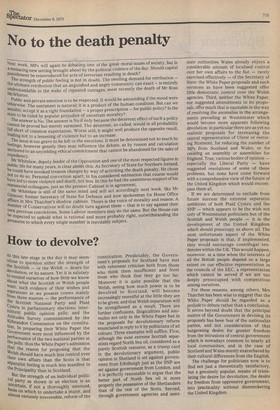ilow to devolve?
At this late stage in the day it may seem Otiose to question either the strength of the Scottish — or the Welsh — desire for devolution, or its nature. Yet it is salutary to remind ourselves of how little we know about what the Scottish or Welsh people Want: such evidence of their wishes and aspirations as we possess comes mainly from three sources — the performance of the Scottish National Party and Plaid Cymru in parliamentary elections; intermittent public opinion polls; and the Attitudes Survey commissioned by the Ibrandon Commission on the constitu,t,Iml. In preparing their White Paper the '-lovernment were most influenced by the Performance of the two national parties at the polls: thus the White Paper's admission that the reason for proposing that the Welsh should have much less control over their own affairs than the Scots is that separatist feeling is much less manifest in the Principality than in Scotland. But the strength of an individual political party as shown in an election is an uncertain, if not a thoroughly unsound, basis on which to undertake a major, and almost certainly irreversible, reform of the constitution. Predictably, the Government's proposals for Scotland have met with vehement criticism both from those who think them insufficient and from those who think that they go too far. Moreover it is quite possible that the Welsh, seeing how much power is to be devolved to Scotland, will become increasingly resentful at the little they are to be given; and that Welsh separatism will be strengthened as a result. There are further confusions, illogicalities and anomalies not only in the White Paper but in the proposals for devolutionary reform enunciated in reply to it by politicians of all colours. Three examples will suffice. First, although the most extreme Scottish separatists regard North Sea oil, considered as a purely Scottish resource, as a trump card in the devolutionary argument, public opinion in Shetland is set against government from Edinburgh just as the SNP are set against government from London, and it is perfectly reasonable to argue that the better part of North Sea oil is more properly the possession of the Shetlanders than of the rest of the Scots. Second, through government agencies and semi state authorities Wales already enjoys a considerable amount of localised control over her own affairs to the fiat — rarely exercised effectively — of the Secretary of State: the White Paper proposals and such revisions as have been suggested offer little democratic control over the Welsh agencies. Third, neither the White Paper, nor suggested amendments to its proposals, offer much that is equitable in the way of resolving the anomalies in the arrangements prevailing at Westminster which would become more apparent following devolution: in particular there are as yet no realistic proposals for increasing the central representation'of Ulster or restoring Stormont, for reducing the number of MPs from Scotland and Wales, or for creating an assembly or assemblies for England. True, various bodies of opinion — especially the Liberal Party — have suggested resolutions of some of these problems, but none have come forward with a comprehensive view of the future of the United Kingdom which would encompass them all.
If we are determined to exclude from future success the extreme separatist ambitions of both Plaid Cymru and the SNP — which appears to be the wish not only of Westminster politicians but of the Scottish and Welsh people — it is the development of the United Kingdom which should preoccupy us above all. The most unfortunate aspect of the White Paper proposals is that, if implemented, they would encourage contrifugal tendencies within the UK. This would happen, moreover, at a time when the interests of all the British people depend to a large extent on our effective representation in the councils of the EEC, a representation which cannot be served if we are too deeply preoccupied with competition among ourselves.
For these reasons, among others, Mrs Thatcher has been wise to suggest that the White Paper should be regarded as a prelude to debate rather than a conclusion. It seems beyond doubt that the principal motive of the Government in devising its proposals has been fear of the nationalist parties, and not consideration of that burgeoning desire for greater freedom from the intrusions of central government which is nowadays common to nearly all local communities, and in the case of Scotland and Wales merely exacerbated by their cultural differences from the English.
The challenge for politicians now is to find not just a theoretically satisfactory, but a genuinely popular, means of translating the desire for devolution, the desire for freedom from oppressive government, into practicality without dismembering the United Kingdom.

































 Previous page
Previous page